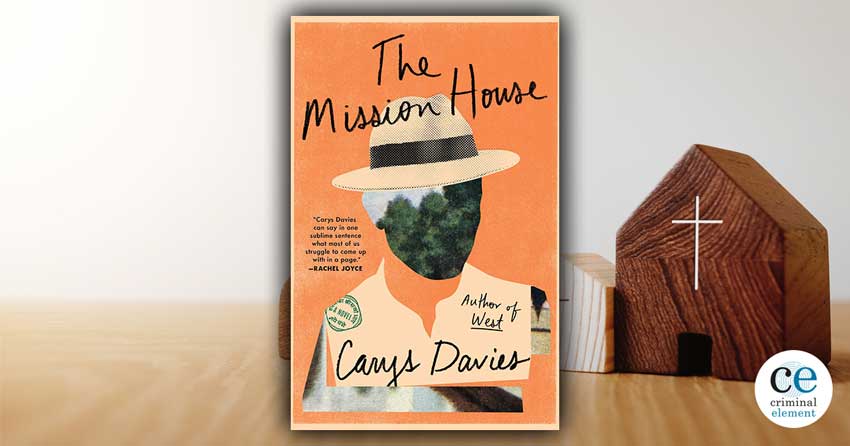Book Review: The Mission House by Carys Davies
By Doreen Sheridan
February 25, 2021
The Mission House by Carys Davies is a captivating and propulsive novel following an Englishman seeking refuge in a remote hill town in India who finds himself caught in the crossfire of local tensions and violence.
Award-winning novelist Carys Davies’s latest novel opens on the wilting Hilary Byrd, an Englishman abroad whose dissatisfaction with his life is palpable as he struggles with the heat of the plains of India before following a rumor of refuge to a hill station in the cool highlands. On the train trip over, he meets the priest of the town’s Protestant church, who offers him cheap, temporary lodging at the mission house next to Padre Andrew’s own. The missionary who had been staying there has gone back to Canada to sort out some visa issues, so Padre Andrew is happy to have Byrd move in for a while despite the latter being not much of a Christian, a standard Church of England upbringing notwithstanding.
Byrd is initially wary of his new surroundings but begins to relax as he grows more familiar with the place—or, perhaps, as the foreign town becomes more familiar to him.
And yet he wasn’t sure if he’d like it as much as he did if it weren’t for the things that were like home and therefore made him feel at home—the calm orderliness of the Botanical Gardens, for instance, and the Victorian splendor of the old library; the gingerbread eaves of the post office and the piles of Penguin paperback books in Higginbotham’s, all in English, most of which he knew like the back of his hand.
Perhaps—he found himself saying to the old man, Jamshed, as they drove through the town and Byrd sat on the floor of the clattering auto just behind him—it was the combination of the strange and familiar that suited him. Perhaps there was a balance that was just right for his personality. Perhaps it provided him with a sort of perfect equilibrium.
Jamshed, his usually silent if devoted auto-rickshaw driver, is happy to listen and take Byrd wherever he wants to go and even happier to rake in more wages than usual due to having a repeat customer he doesn’t have to fight the other local drivers over. The money is going to fulfill the off-beat dreams of the only family he has left, his nephew Ravi. But as the days progress, Jamshed’s initial interest in Byrd grows into a fondness for his odd, anxious passenger, causing him to one day make a terrible choice that lands Byrd in the maelstrom of unexpected violence.
For Byrd, absorbed as he is in his own demons, deliberately knows little of politics and conflicts in the wider world. This blissful ignorance is something that Padre Andrew, for one, cannot afford, not with news of his country’s religious unrest constantly brought up to him by his own daughter living far away in America. She worries that Hindu ultranationalism—so hostile to every religion except its own—will paint a target on her father’s back. Padre Andrew tries to assuage her fears but can’t quite quell his own, asking Byrd over dinner one night:
Was the UK also in trouble? he asked, munching rapidly on a handful of fryums. People wanting to be surrounded only by people who were the same as they were? Wanting to travel back in time to a golden place? He told Mr. Byrd about the beatings and the burnings, the lynchings and riots, and Hilary Byrd looked up from his plate. There was an absent look on his face, as if he was not quite present and had more important matters on his mind. Was the UK in trouble? Byrd said he didn’t know, he wasn’t sure. Everyone seemed excited about the Olympics—very happy and proud and patriotic—but beyond that, he couldn’t say. It was a long time since he’d traveled anywhere beyond Petts Wood, and that seemed like a peaceful enough place.
The world of 2011, a mere decade ago when this novel is set, feels so far gone already as Brexit and the ongoing unrest in India—never mind a pandemic amid the global rise of right-wing nationalism and worse—have changed political landscapes such that only the very lucky can claim to lead lives untouched by the bitter fruits of xenophobia. Though Padre Andrew tries to focus on his most pressing concern, the almost Austen-like need to marry off his ward, Priscilla, the dark shadow of irrational hatred will not leave even his remote household alone. The tension is almost unbearable as this seemingly quiet novel of seeking connections uses its final chapters to underscore how ignoring the political for the personal can only lead to sorrow.
Even so, Carys Davies reminds us there is hope in love and in friendship. I personally disagreed with Byrd’s choice as being impractical even as I’m hoping for the best in his ambiguous ending. My heart is still pounding as I write this, thinking of those exquisitely suspenseful chapters. The Mission House is a book that will live long in the memory, a snapshot of the global lull before the storm, a subtly determined subversion of colonial tropes that is also a celebration of the enduring power of the human spirit to choose courage in the pursuit of amity.
